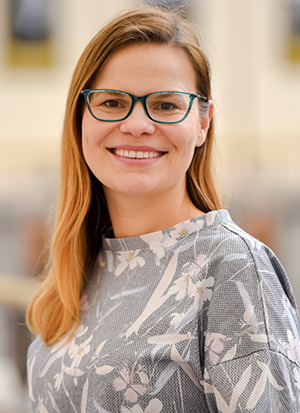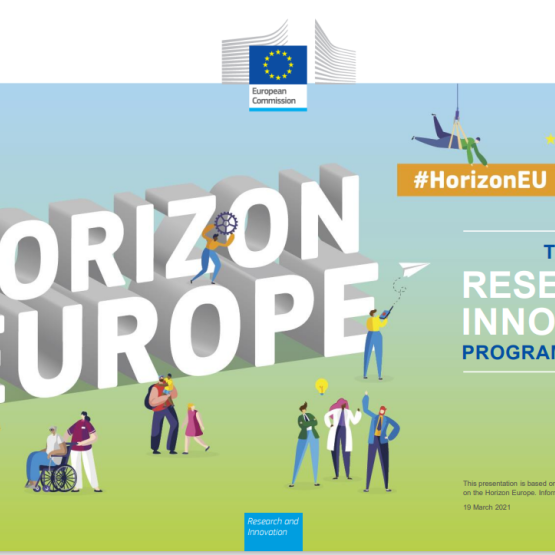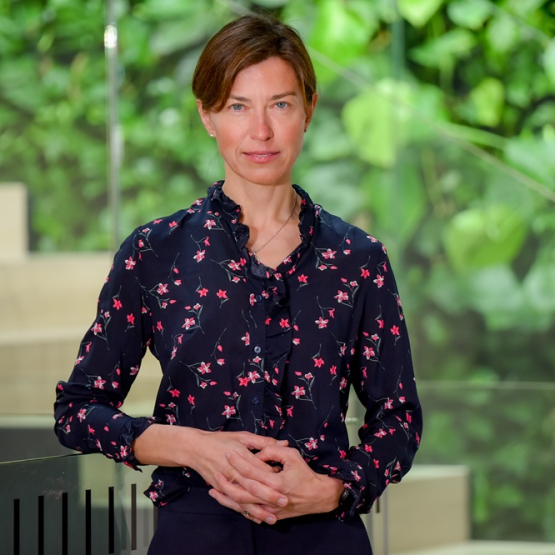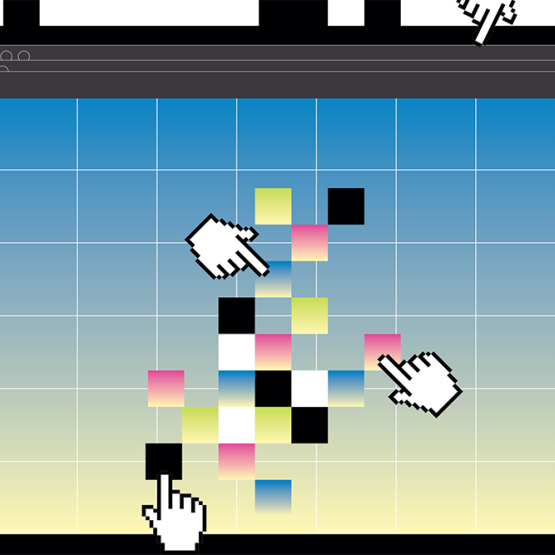
We present three profiles of outstanding female researchers associated with the SGH Warsaw School of Economics. Their scientific achievements have an impact on our reality. The aim of the Regional Excellence Initiative Programme (RID) initiative is to show to a wider audience how the results of scientific research are applied in practice. We hope that these stories will become an inspiration for the university community, especially for young researchers beginning their academic careers.
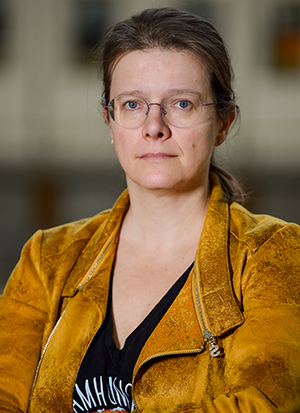
Habilitated Doctor KATARZYNA GÓRAK-SOSNOWSKA Professor at SGH
On a formal level, my scientific career has always been troublesome for me, because it was difficult for me to fit into one specific scientific discipline. As a result, my education to date has been very diverse – I have not obtained more than one degree or professional title in any scientific discipline. I have a triple Master’s degree (international economic and political relations, and management and marketing at the SGH Warsaw School of Economics, as well as psychology at the University of Social Sciences and Humanities), a doctor of economics (SGH Warsaw School of Economics) and a postdoctoral degree in humanities in cultural and religious studies (Jagiellonian University). My interdisciplinarity, generally, gives me a wide field to discover new research paths, but sometimes it clearly does not resonate with me, especially when I am applying for further academic degrees.
Professionally, my academic life is associated with the SGH Warsaw School of Economics, where I started working in the Department of Sociology (again not a good fit), and then, after several years, moving to the Department of Political Studies at the Socio-Economic Collegium (partially a good fit). Since 2018, I have been the head of the Middle East and Central Asia Department at the Institute of International Studies (ISM). While working at ISM, I began to identify more strongly with political science and administration (also due to the fact that since 2020 I have been a vice-president of the Scientific Council of the discipline of political science and administration, although nominally I hold only a master’s degree in the related field).
In 2012, I was appointed Deputy Dean of the Master’s Studies at the SGH Warsaw School of Economics for eight years. This new experience, or rather an adventure as a clerk, has strongly translated into my scientific interests, as well as my professional development, which I am currently pursuing at the Academic Administration Forum (FAA). For seven years, we have been organising nationwide industry conferences, attended by 300 to over 800 people. We also try to affect the provisions of generally applicable law. As a researcher, I naturally expanded the activities of the FAA to include research on higher education administration, which resulted in several collective publications and my recent monograph (Non-academic employees. Around the Concept and Its Consequences, Warsaw School of Economics: Warsaw 2024).
During over 20 years of professional work, I have been strongly involved in teaching and popularising activities. I have conducted classes at several universities, I have also conducted several hundred hours of workshops for secondary school students as well as trainings for teachers and members of non-governmental organisations in the field of broadly understood interculturality, mainly in the context of Islam and Muslims. I have developed a dozen teaching materials (published on paper and online), three of which have been translated into foreign languages (English, Czech, Estonian, Latvian, Romanian, Hungarian).
Throughout my scientific life, I have tried to obtain grants to carry out my research, but I have only started implementing international projects of a scientific or scientific-educational nature since 2019. Since then, I have participated in the implementation of 12 projects financed from domestic or foreign sources, of which in the case of seven I was the manager of the entire project, three – the manager of the Polish part of the project and two – the contractor. The domestic sources of funding include the National Science Centre (OPUS), NAWA (Strategic Partnerships, Intervention Grants) and the already completed the Dialogue programme of the Ministry of Science and Higher Education, and foreign funding are Erasmus+ (Jean Monnet Project and Strategic Partnerships) and the European Commission (Programme and Horizon via CHANSE).
For my work at SGH, I have been receiving awards from the SGH Rector every year for almost a decade. My highest distinction so far is the award of the Minister of Science obtained in 2024 for significant achievements in the field of scientific activity.
RESEARCH AND ITS IMPACT ON SOCIETY
I have decided to list three research areas which I will discuss in order of importance. These are: (1) Muslim communities in Poland; (2) research on higher education administration and (3) research on the contemporary Middle East and North Africa. I treat the first research area as the most important as I publish the results of my research in English in monographs and international journals. The research conducted in the second area is largely of an applied nature – importantly, that thanks to it I can try to affect the socio-institutional reality. Research in the third area is of descriptive or problematic character and aims to supplement the knowledge in Polish about the contemporary Middle East.
MUSLIM COMMUNITIES IN POLAND
Muslim communities in Poland are my main area of research. I place them in the “Western” context and theoretical framework, showing the specificity of the functioning of these communities in the Polish social context. Thanks to this, my research can enter into a dialogue with English-language literature devoted to Muslim communities in the West. The research is interdisciplinary and addresses such issues as Islamophobia, religion and religiosity, education and race. Some of the studies are descriptive – most often these are publications devoted to Poland in thematic foreign publications.
The dominant theme in this research is Islamophobia in Poland. I was interested in this topic in the context of the migration crisis, when for the first time on such a large scale anti-Muslim sentiments found their way into the public space, and in the following years they became an important element of the political campaign. I was interested in why the Polish society, in which the number of Muslims is so insignificant, shows strongly negative – compared to the countries of the so-called old European Union – attitudes towards Islam and Muslims. I soon became convinced that the attitude of Poles towards Islam and Muslims is related to the discourse on Islam in Western European countries and the specific position of Poland in the EU. I was particularly interested in the image of Islam and the behaviour of Muslim students in the school context. As part of the EMPATHY project, I coordinated research on Polish textbooks in terms of themes about Islam and Muslims. I also conducted a study among Muslim adults who attended Polish schools, looking at their behavioural strategies as “the only Muslims in the classroom” (and sometimes also at school).
Another area of my research is the religion and religiosity of Muslim communities in Poland, especially converts to Islam. The research on Polish female converts to Islam has become the subject of an NCN OPUS grant. Publications that have been created as a result of this project, including the main monograph Managing spoiled identity. The case of Polish female converts to Islam (co-authors: B. Abdallah-Krzepkowska, J. Krotofil, A. Piela), published by Brill publishing house (Leiden 2023), show the behaviour of Polish female converts to Islam in the specific Polish socio-cultural context and their religious socialisation to Islam. Importantly, online sources play an important role in learning Islam. I continue this topic in the DIGITISLAM project (within a CHANSE project coordinated by the University of Edinburgh), in which we are exploring Muslim online spaces together with teams from the UK, Spain, Sweden and Lithuania.
HIGHER EDUCATION ADMINISTRATION
The issue of higher education administration is the only area that does not fit in with my other research in any way. I became interested in it when I was a Vice-Dean at the SGH Master Study Dean’s Office for purely practical reasons: I wondered how to optimise the work of this unit at the beginning of the academic year, when there is the greatest accumulation of tasks. At that time, I initiated research on the effectiveness of the operation of dean’s offices at universities, which resulted in the organisation of a nationwide conference for dean’s offices staff. While academic teachers naturally present their research and discuss it with each other at scientific conferences, there were no similar events for university administrative staff.
The contact with administrative staff on a different level than the hierarchical official relations in my own unit made me realise how much both groups of university staff – academic teachers and non-academic staff – differ from each other in terms of status, and also allowed me to gain insight into this internally diverse professional group. I usually prepare these publications in co-authorship with administrative staff – not only to use their expert knowledge, but also to give them a voice in matters that concern them.
RESEARCH ON THE CONTEMPORARY MIDDLE EAST AND NORTH AFRICA
After obtaining my postdoctoral degree, I dealt with the Middle Eastern issues to a limited extent; most of my studies on this region are synthetic and descriptive, and I prepare them on an ad hoc basis – usually following an invitation to publication. Sometimes I come across niches that have not been developed, but I think it is worth it – this is how the monograph Takaful – Muslim insurance (Warsaw School of Economics, 2020) was created, developed with Dr. Renata Pajewska-Kwaśny, which was the first and (probably still is) the only publication in Polish on Muslim insurance.
Recently, I have managed to find a niche in which I can deal with the Middle East in such a way that the results of my research are part of international research. The contribution to outlining this niche was the field research in Saudi Arabia and Bahrain, which I conducted in July 2023. Conversations with Polish businessmen directed my interests towards Polish labour migrants in the Persian Gulf countries. These people are described as expats (and not labour migrants, as Polish immigrants in Western Europe often are referred to) and coming from the West (which is interesting in the context of the problematic semi-peripherality of Poland in Europe/West). I want to develop these topics as part of the CEEMEA project (NAWA grant – Strategic Partnerships, which I obtained in July this year).
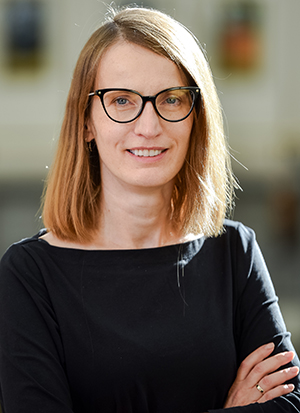
Habilitated Doctor IGA MAGDA Professor at SGH
Head of the Department of Economics I and SGH Rector’s Representative for Equal Treatment. She is also associated with the Institute for Structural Research Scientific Foundation and a member of the IZA Research Fellows network. In terms of research, she is interested in labour economics, in particular the subject of gender inequality in the labour market, family policy and social policy. She managed research projects financed by the European Commission, Norway Grants and the National Science Centre (NCN). She has published, for example, in Feminist Economics, Journal of Comparative Economics, IZA Journal of Labor Policy, Empirical Economics or Industrial Labour and Relations Review (ILRR).
In her research in recent years, Prof. Iga Magda has focused on various dimensions of inequality between women and men in employment and income, analysing individual stages of professional careers. For example, the article co-authored with Dr. Anna Knapińska, Dr. Marzena Feldy and Dr. Jacek Bielecki and accepted for publication in the Journal of Economic Inequality analyses wage differences of doctoral graduates, focusing on the impact of parenthood on earnings. The study is based on data from the ELA system of the entire population of doctoral students employed at Polish universities in 2014–2018. The results showed a small but stable gender pay gap at the beginning of their academic careers, growing significantly when non-academic income is taken into account. The basic income of mothers in academia is 18-20% lower than that of childless women, while fathers receive a substantial salary bonus of 33-37%. The study proves that academia is not free from gender and parenthood pay inequalities. This article was written as part of the OPUS project Why do women earn less? The beginnings of the professional career of men and women, financed by the National Science Centre, Poland.
The second article Gender pay gaps across the STEM fields of study, written as part of this project together with Dr. Tomasz Zając, Dr. Agnieszka Chłoń-Domińczak, Dr. Marek Bożykowski and Dr. Mikołaj Jasiński, concerned the gender pay gap in STEM (science, technology, engineering and mathematics) fields of study. The study shows that in the first year after graduation, women earn over 20% less than men. This difference increases over time. There is also a significant variation across STEM, both in terms of size of the gender pay gap and how it changes over time. This difference is largest among graduates of mathematics and amounts to over 25%, while among graduates of chemical and earth sciences it does not exceed 3%. As these gaps narrow only slightly over the first four years of graduates’ careers, the efforts made by policymakers to increase the number of women pursuing STEM degrees may not be sufficient to achieve the gender pay equality. The article was published in the journal Studies in Higher Education.
In another article, Prof. Magda and her co-authors from the SGH Warsaw School of Economics (Dr. Agnieszka Chłoń-Domińczak, Dr. Magdalena Smyk, Dr. Paweł Strzelecki, Prof. Irena Kotowska and Karolina Bolesta) investigate the impact formal and informal childcare in early childhood and education policies on the employment of women and men and the pay gap, taking into account the life stages characteristic of childcare tasks. Early care and education policies are framed by the types of social investment strategies identified in the EU countries to illustrate changes in social investment since 2005. The research shows that better provision and use of early childhood education and care not only contributes to early investment in human capital, but also facilitates the employment of mothers, thereby helping to reduce the gender employment and pay gap.
Part of Prof. Magda’s research focuses on enterprises. The article Gender pay gaps in domestic and foreign-owned firms, published in Empirical Economics, written with dr. Katarzyna Sałach, shows that the gender pay gap is higher in foreign-owned enterprises. The text The gender wage gap in the workplace: does the age of the firm matter?, written with Dr. Ewa Cukrowska-Torzewska for the European Journal of Industrial Economics indicates that the wage differences between women and men are smallest in the youngest companies. In Central European countries, the size of the gender pay gap clearly increases with the age of the company; while in the older EU member states such a relationship does not exist. The levels of gender pay inequality appear to be highest in the previously state-owned companies privatised during the transition period.
The work Gender dimension of occupational exposure to infection in Europe, published in Feminist Economics, combines the subject of gender inequality with the issues of a different position of women and men in healthcare systems. Women in Europe are more likely to be infected because they are more likely to work in occupations that require a high level of contact and physical proximity at work, according to the study. Women are also less likely to work remotely, which contributes to their increased exposure. The study found out that gender is a more important factor in workers’ exposure to infection than their education or age.
In 2024, the Journal of Family and Economic Issues published the article by Iga Magda, Ewa Cukrowska-Torzewska and Marta Palczyńska What if she earns more? Gender norms, income inequality and distribution of domestic work, examining the relationship between women’s contribution to household income and the distribution of domestic work between partners, while taking into account their attitudes towards gender roles.
In her research work, Iga Magda also addresses the issues of active labour market policy and the situation of young people on the labour market. These issues are the subject of the article Labour market policy for youth in Poland, written with Karol Madoń, Marta Palczyńska and Mateusz Smoter, published in Gospodarka Narodowa. The Polish Journal of Economics.
The results of Prof. Magda’s research have been presented many times at international conferences and seminars. In addition to contributing to science, they also have a practical dimension, supporting evidence-based policies on gender equality in the labour market. For example, the implementation of the project Why do women earn less? The beginnings of the professional careers of men and women allowed to expand the knowledge of the sources of wage inequality between women and men. This knowledge is necessary, for example, to implement the EU Pay Transparency Directive. The directive requires decision-makers to build a system for monitoring the wages of men and women in various dimensions. The acquired knowledge also allowed for cooperation in the development of the draft law on the pay gap. An example of practical promotion of research results can be the presentation of the results of research and analyses of the pay gap during the last February meeting of the Council for Women in the Labour Market at the Ministry of Family, Labour and Social Policy, responsible for the transposition of the Directive.
Habilitated Doctor MONIKA RAULINAJTYS-GRZYBEK Professor at SGH
Head of the Management Accounting Department at SGH and #SGH for Healthcare Think Tank. Director of Executive SGH-WUM MBA in healthcare studies. Expert in the area of finance and management in healthcare and health policy. Member of the Tariffication Council of the 1st term at the Agency for Health Technology Assessment and Tariffication. She cooperates with medical entities as a management consultant in the area of controlling and a member of Social Councils. She manages scientific and implementation projects related to the management of health services at the international and national level. One of the projects she leads is CaregIVR – on behalf of SGH, 9 research workers and a group of students participate in the project.
DESCRIPTION OF RESEARCH
An important research project currently being carried out at the SGH Warsaw School of Economics in the area of health is the CaregIVR project, financed by the EU4Health programme, planned for 2024-2026. SGH operates in an international partnership of four universities – together with Atlântica – Instituto Universitário (Project Leader) from Portugal, Universidad de Huelva from Spain and Università di Firenze from Italy. The competences of the SGH team in the area of management, public administration, as well as international contacts with Ukrainian partners and experience in working with the Ukrainian community are particularly valuable in the project. The call, under which the project is financed, was announced shortly after the outbreak of the war in Ukraine and one of its goals is to support Ukrainian citizens in improving their health competences and competences in the labour market.
The project is aimed at informal caregivers of people after a stroke. In Europe, approximately 2.5 million people suffer a stroke every year, and after leaving hospital, many of them remain under the constant care of informal caregivers – people without medical education, most often family members or paid caregivers. These people are not covered by a structured training system, both in terms of patient care and in the organisation of space or household life with a person after a stroke. Healthcare focuses on supporting the patients themselves, not their informal caregivers. As a result, the potential of home care is not used as effectively as it could be – which is confirmed by the analysis of the literature. The competences of an informal caregiver in the field of care are important from the perspective of the patients themselves, because they receive better support in everyday life. They are also important from a systemic perspective – the currently implemented reform of the health care system indicates reversing the pyramid of benefits, i.e. providing support as close to the patient as possible and at the lowest possible cost. The basis of the model of the proper pyramid is self-care and home care, including that provided by informal caregivers.
The aim of the project is to create diverse tools that will be useful in raising the level of knowledge and developing competences of informal caregivers. A certain novelty is the use of virtual reality to train informal caregivers. After putting on VR glasses, the participant will be able to obtain information on how to perform basic activities with the patient, as well as how to prepare the space to support everyday life. A set of possible scenarios was developed during activities of twelve focus groups conducted in four countries. The participants discussed the challenges faced by informal caregivers and the needs in terms of knowledge and competences. The substantive basis for developing the focus group scenarios were the results of previously conducted research – a literature review (rapid review method), quantitative analysis of health data on the patient population and quantitative research among informal caregivers (a survey on 120 informal caregivers).
Qualitative research will allow for the extraction of several dozen scenarios, which the project team grouped into three basic categories: better understanding of the patient, improving competences in the field of care and improving the emotional state of caregivers. The first category includes scenarios that allow us to better empathise with what the patient is struggling with. A stroke causes health effects that may be difficult to imagine for a healthy person. An example of such an effect is hemispheric neglect syndrome, which involves not seeing half of the space on the opposite side of the brain to the hemisphere where the stroke occurred. A “half” image of the world can be conveyed by virtual reality and allows us to understand why the patient is afraid to walk down the street or corridor – which in their eyes borders on an abyss or nothingness. Unfortunately, VR is not able to answer all problems equally well. One such example is aphasia, or patient’s inability to speak. Such problems will be presented in the project using more traditional tools – recordings or expert statements.
The second category concerns all activities performed by the caregiver, which initially arouse great fear and concern about harming the patient. Sometimes it is also forgotten that activities requiring force (e.g. moving the patient), if performed incorrectly, can harm the caregiver. Strokes are more common among men, and their informal caregiver is usually the wife. The teams identified over 30 scenarios covering, for example, feeding, dressing, and toileting, as well as issues related to preparing the home to receive the patient and providing first aid. VR glasses allow for operation in three-dimensional space, for example in the apartment scenario. Currently, the team of developers is creating selected scenarios, which should be available for testing in early 2025.
The aim of the project is not only to better prepare caregivers to care for the patient, but also to equip them with tools that will allow them to take better care of their own health. As research conducted in many places around the world shows, caring for a chronically ill person (after a stroke) increases the risk of cardiovascular diseases, as well as depression. Therefore, the last group of scenarios includes aspects related to issues such as respite care for the caregiver or relaxation mechanisms.
The next steps in the project will include testing the developed tool in four laboratories, organised in four universities participating in the project. We are also planning such meetings at SGH and organisations offering support to stroke patients and their families.
SOCIAL IMPACT
The use of new technologies in healthcare has the potential to increase efficiency in areas where we have not achieved positive results so far – primarily due to the budget, staffing or other constraints. In the face of medical staff shortages, health education or prevention issues always fade into the background in the face of the need to provide immediate services. However, this is a long-term goal that has the potential to improve the health of the population, and that is why we should not lose sight of it.
The concept which is being developed fits the needs of informal caregivers – as confirmed by the conducted surveys and conclusions from focus groups. A ready tool may be used by caregivers, for example, during the patient’s stay in hospital or in another organisation providing support to patients and their families. It can support medical personnel in the process of educating patients and their families.
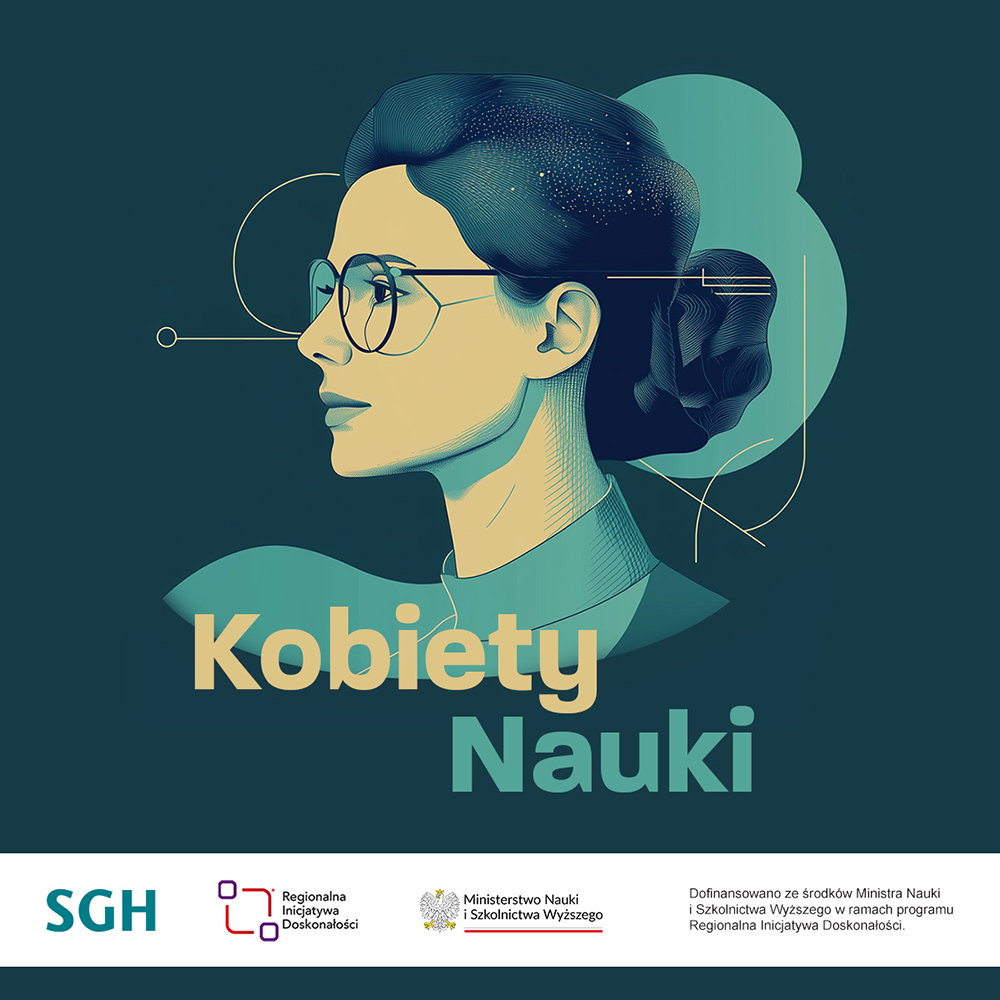
Women of Science podcast produced by the SGH Warsaw School of Economics in cooperation with Radio 357. Published in cooperation with Regional Initiative of Excellence and Ministry of Science and Higher Education. Co-financed by the Minister of Science and Higher Education under the programme Regional Initiative of Excellence.

